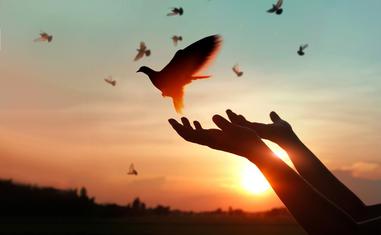The views expressed in our content reflect individual perspectives and do not represent the authoritative views of the Baha'i Faith.
The other day a friend asked me “What’s your most precious possession?” The question had never occurred to me before, so I answered “Give me a minute to think that one through.” What’s yours?
I thought about the usual material possessions first – house, car, etc. – but they’re all replaceable things, so the word precious, which means “of great value, beloved, dear” according to the dictionary, doesn’t really apply.
RELATED: Materialism: What Advantage in the Things You Possess?
I thought of an old heirloom that my family has passed down to me – a six-sided silver vase given to my great-grandfather by Pancho Villa – but that didn’t fit the description exactly, either.
Then my most cherished relationships came to mind, but of course people can’t ever be possessions.
Finally, I had the surprising realization that my most precious possession is peace.
Think about it: if you lived in a war zone, where human conflict and savagery reigned, you would probably have nothing. Your material possessions would be destroyed. Your relationships would be gone, or at least ravaged by war. Your stability, your mental health, even your ability to love others, could be mangled and forever lost. War can take everything.
How do I know? I lived through a war, and have seen it strip away every vestige of happiness and human dignity.
This passage from the writings of Abdu’l-Baha aptly describes the extreme human costs of doing battle with one another:
… war is destruction while universal peace is construction; war is death while peace is life; war is rapacity and bloodthirstiness while peace is beneficence and humaneness; war is an appurtenance of the world of nature while peace is of the foundation of the religion of God; war is darkness upon darkness while peace is heavenly light; war is the destroyer of the edifice of mankind while peace is the everlasting life of the world of humanity; war is like a devouring wolf while peace is like the angels of heaven; war is the struggle for existence while peace is mutual aid and co-operation among the peoples of the world and the cause of the good-pleasure of the True One in the heavenly realm.
Today much of the world lives in relative peace, at least on a macro global level. Much of the world has enjoyed that general freedom from all-consuming war for three-quarters of a century. Since the end of World War II, the planet’s most powerful nations have engaged in multiple proxy wars in places like Vietnam, the Middle East, and Central America, but those terrible fights have at least remained regional rather than roaring into another world-consuming fire.
This period of relative peace doesn’t mean we’ve gotten rid of the scourge of war – far from it. The world’s current conflictual “hot spots” – Syria, Yemen, Afghanistan, Iraq, Myanmar, Somalia, South Sudan, Ukraine, and Libya among them – have witnessed the horrors of war for some time now, but none have (yet) spiraled into wholesale warfare on a worldwide level.
In spite of these regional wars, most who’ve grown up during the post-1945 period of relative global peace have lived through a unique experience – a kind of fragile lesser peace, where at least three succeeding generations of the vast majority of the world’s population has not had to directly suffer as a result of the destruction of their cities and nations. What do we have to thank for that reality?
Baha’is believe that the revelation of Baha’u’llah, the prophet and founder of the Baha’i Faith, has ushered in an historical period when humankind has the capacity, the teachings, and the tools to construct a durable and lasting peace. Baha’u’llah wrote:
This is the Day in which God’s most excellent favours have been poured out upon men, the Day in which His most mighty grace hath been infused into all created things. It is incumbent upon all the peoples of the world to reconcile their differences, and, with perfect unity and peace, abide beneath the shadow of the Tree of His care and loving-kindness. …
It is not for him to pride himself who loveth his own country, but rather for him who loveth the whole world. The earth is but one country, and mankind its citizens.
In that famous phrase – “The earth is but one country, and mankind its citizens” – Baha’u’llah presciently proclaimed the oneness of our planet and its people. In the middle of the 19th century, his teachings far, far ahead of their time and even unimaginable to most, Baha’is began to work for world unity. Since then, both science and religion have contributed to the shrinking of the world into a virtual neighborhood – one that depends for its continuing existence on a largely unwritten international pact, the vague outlines of which we’re just now beginning to perceive and bring about.
RELATED: Demanding a More United World
We refer to that international pact as a “global order,” and it now dominates the relationships between the world’s 200 nations. This has never happened before.
Called the “rules-based international order” or the “community of nations” or even “security co-binding,” this global order has functioned – through formal multilateral organizations, diplomacy, treaties, and trade agreements; and equally importantly through informal norms, citizen travel, and exchanges between countries – to bring us closer together and cement ties of commerce, commonality, and world citizenship. While this global order may seem invisible or amorphous to most, it has helped bring us the limited lesser peace we all should cherish as our most precious possession.
Today, however, that global order is under assault. Despite the fact that it has brought us nearly eight decades without world war, it faces many forces that threaten to topple it: authoritarian political trends, corrosive class and racial divisions, the proliferation of weapons systems, the deadly coronavirus pandemic, the world’s widening income inequality, the pressures of climate change, migration, and the deteriorating civil cohesion that web-based misinformation and propaganda has abetted.
In this series of essays, we’ll take a serious look at those trends and where they might take us, with the help of a detailed analysis from futurists at the combined American intelligence agencies, and the prescriptions for peace in the modern age recommended by the Baha’i teachings.

















Comments
Sign in or create an account
Continue with Facebookor